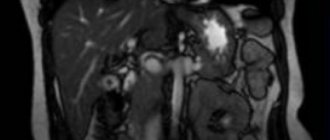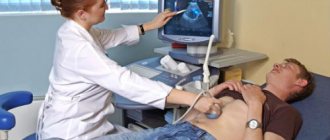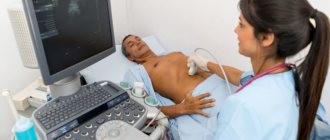Immunological tests “Colon View Hb and Hb/Hp” are based on an immunochromatographic method in which hemoglobin (Hb) and hemoglobin/haptoglobin complex (Hb/Hp) are recognized through specific reactions with antibodies. Essentially, these are rapid tests for the qualitative detection of hidden blood loss from the gastrointestinal tract.
Causes of blood loss from the gastrointestinal tract:
- colorectal cancer
- adenomatous polyps
- inflammatory bowel diseases
- diverticular disease
- vascular anomalies (hemangiomas, telangiectasia, etc.)
- erosive and ulcerative lesions of the gastrointestinal tract (for example, due to long-term use of painkillers)
- and some other diseases.
Colorectal cancer develops slowly. The danger of intestinal cancer lies in the absence of significant symptoms in the early stages of the disease. The disease may begin as one or more polyps that develop in the wall of the colon or rectum.
Stool samples are tested for the presence of occult blood, that is, blood that is invisible to the eye but present in the stool is determined. The tumor or polyp secretes a small amount of blood already in the early stages of the disease.
All people over 40 years of age must have a stool test for occult blood every year. Detection of hidden blood in the stool indicates the need for consultation with a coloproctologist, gastroenterologist and further examination - colonoscopy. The earlier a disease is detected, the better it can be treated.
Indications
The presence of factors that increase the risk of developing colorectal cancer (colon and rectum):
- age over 40 years
- high meat diet
- obesity and overweight
- passive lifestyle
- smoking and alcohol abuse
- having close relatives with colon cancer
- The presence of mild or rarely occurring intestinal symptoms (bloating, loose stools, discomfort), which may be the initial signs of colorectal cancer or other intestinal diseases (diverticula, polyps, erosions).
Am I at risk?
Your risk of colon cancer may be higher than average if:
- you or your close relatives have had polyps or colon or rectal cancer;
- you have inflammatory bowel disease;
- you have a family history, such as familial adenomatous polyposis (FAP) or hereditary nonpolyposis colon cancer.
If you think your risk of developing colon cancer is significantly higher than the population average, talk to your oncologist about it. He or she may suggest that you get screened more often or enroll in screening programs at a younger age, rather than waiting until age 50.
Methodology
You will be given a kit .
- Collect the stool sample in a clean, dry container or reservoir, such as the stool collection paper included in the kit.
- Unscrew (colored edge) and remove the applicator stick from the sample tube. Be careful not to spill or splash the solution from the container.
- Collect samples by inserting the applicator wand into various locations on the surface of the stool sample.
- Place the applicator stick back into the test tube and screw the cap on tightly.
- Samples must be delivered to the EXPERT Clinic.
- Unless there are special recommendations from your supervising physician, do not collect samples if there is blood in the urine or stool, as well as during menstruation or 3 days before and after it, if you have constipation, or if you are taking rectal (injected into the rectum) medications, drugs for blood thinning or large doses of aspirin and other non-steroidal anti-inflammatory drugs (ibuprofen, paracetamol, etc.).
Indications for diagnosis using tumor markers
Blood samples are taken on an empty stomach.
Tests are taken in any laboratory. The biological material will be the presence of markers that are released in the small or large intestine. There are some conditions that must be met before starting the test:
- blood must be donated on an empty stomach;
- after this, blood is donated eight hours later after eating;
- Before taking this test, you should not eat fatty or spicy foods or drink alcohol;
- the patient should also not smoke;
- blood is drawn after the patient has rested for 15 minutes.
To be able to detect Tu M2-RK, it is necessary to undergo a stool test. It happens when you go to the toilet naturally. You cannot take laxatives, and you must not use an enema. Two teaspoons of feces are placed in a special container, after which it is sent to the laboratory.
The results will be available after seven days.
Benefits of the Colon View test
- Quick and easy test
- Non-invasive (only requires collecting a stool sample)
- High sensitivity blood detection
- Does not require a diet before performing (unlike traditional methods of assessing blood in stool)
- Specific to human blood (for example, eating meat and fish dishes with blood in them does not affect the result)
- The effectiveness of the test as a screening tool for colorectal cancer has been confirmed by clinical studies.
Colon Cancer Screening
Colon cancer is also called colorectal cancer (CRC) and can affect the rectum, sigmoid colon, or colon. The colon is one possible location of cancer for which screening has been proven effective, that is, regular examinations in the absence of symptoms.
Screening for colon cancer allows you to detect pathology at an early stage or in the form of benign formations that have not yet become malignant (polyps). Timely examination reduces the risk of mortality and increases the chances of successful treatment.
We will talk further about the methods and essence of screening, risk factors, cancer prevention and research available to patients of the MedEx clinic.
Colon cancer screening methods
For the early detection of benign and malignant neoplasms in the intestine, a quick and accessible test is traditionally used.
IFOBT is an immunochemical stool test. It allows you to detect hidden blood in the stool, which can indicate various pathologies: polyps, inflammatory processes, diverticulitis, and sometimes cancer.
If the test shows that there is blood in the stool, the doctor will recommend further testing. A comprehensive ultrasound of the abdominal cavity, colonoscopy, CT colonography and other studies may be prescribed - they are no longer classified as a screening stage, but as an advanced diagnosis.
Colon cancer screening using the TRIMprob bioscanner at the MedEx clinic
As an alternative to traditional studies, the MedEx clinic recently introduced scanning with the TRIMprob device. This is one of the most patient-friendly and body-friendly cancer screening methods. It is not yet widespread in Russia, but has been successfully used in European practice for many years.
A high-precision Italian device emits electromagnetic waves, which, passing through the human body, help detect affected areas. The TRIMprob bioscanner reacts not only to cancer cells, but also to benign formations or inflammation. To distinguish one from the other and make an accurate diagnosis, traditional examination methods are needed, but scanning allows them not to be done “in vain” when the patient is healthy.
During testing in our clinic, the device showed high accuracy in cancer screening of the intestines and other organs.
Several advantages of this method of early diagnosis of rectal or colon cancer:
- A non-invasive method is a study without interfering with the body’s functioning, which means without side effects and discomfort;
- The result is ready in a few minutes thanks to modern digital technologies; no complicated decoding or waiting is required;
- Safety - the device emits frequencies in the UHF range, while the radiation power is less than that of a mobile phone, and it affects the body for only a few minutes.
During the procedure, the doctor analyzes the bioscanner data on the monitor. The interaction of different frequencies with body tissues makes it possible to accurately determine areas that need close attention - changes and damage to the intestines are visible from the scan results.
Risk groups for developing bowel cancer
The screening schedule for colon cancer is drawn up by the doctor individually and depends on what risk group the patient belongs to. Distribution into risk groups depends on health status, heredity and other factors.
Medium risk
The average risk group for CRC (colorectal cancer) includes most healthy people over 55 years of age.
Features of this group:
- There is no “history of cancer” in the family, that is, none of the close relatives have encountered intestinal cancer;
- There is no chronic irritable bowel syndrome, ulcerative colitis or other pathologies.
For these people, the risk of bowel cancer increases slightly with age. Regular examinations are important for them, but cancer screening can begin later than in high-risk and high-risk groups. At the age of 50-55, it is recommended to undergo examination for the first time to exclude the presence of polyps in the intestines or malignant neoplasms.
Increased risk
The high-risk group includes people with a hereditary factor - this means cases when:
- Parents, grandparents, brothers/sisters had colon cancer;
- Some other types of cancer have been diagnosed in close blood relatives: breast cancer, stomach or uterine cancer.
For those who have had the diseases listed in their family, it is recommended to start regular cancer screening earlier - at least from the age of 45. This will allow timely detection of abnormalities with a genetic predisposition to CRC.
High risk
A high-risk group consists of people with hereditary intestinal diseases, which include:
- Diffuse familial polyposis;
- Lynch syndrome;
- Peutz-Jeghers syndrome;
- Nonspecific ulcerative colitis or Crohn's disease that lasts more than 10 years.
Recommendations for screening in this case are discussed with the doctor individually, but examinations should be carried out more often and begin at a young age. For example, those who suffer from diffuse familial polyposis need to monitor their intestinal condition from the age of 20 to prevent the polyps from degenerating into malignant formations. The age threshold for different diseases may vary; your doctor will help you figure it out during your consultation.
Additional risk factors
There are additional factors that negatively affect the condition of the intestines and can be fraught with dangerous complications.
These include, for example:
- Poor nutrition. Low fiber content in food, fatty foods, abuse of processed red meat and dairy products are considered indirect carcinogenic factors for colorectal cancer;
- Sedentary work and lack of exercise habit. Lack of movement also increases the risk of intestinal diseases, including cancer;
- Diabetes;
- Excess body weight;
- Alcohol abuse and smoking;
- Having radiation therapy while being treated for other types of cancer. If the pelvis and abdomen have been exposed to radiation, the risk of colorectal cancer increases.
How often should you be examined?
The age at which it is recommended to start screening for colon cancer and the frequency of examinations are determined by the doctor individually.
But there are some general recommendations for different screening diagnostic methods:
- An immunochemical test is done annually to determine occult blood in the stool;
- Every 5 years it is recommended to repeat CT colonography (also called “virtual colonoscopy”, this is a modern minimally invasive research method);
- Every 10 years, it is advisable to repeat fibrocolonoscopy (today it can be done under sedation - “in your sleep”).
As for cancer screening using the TRIMprob bioscanner, such a study can be repeated annually, just like the occult blood test. This is a comfortable, non-invasive research method that does not have a negative effect on the body and is highly accurate.
Symptoms that should not be ignored
The reason for unscheduled screening for cancer of the colon and other parts of the intestine is unpleasant symptoms.
It is imperative to consult a doctor if you have complaints about:
- Unexplained sudden weight loss;
- Abdominal pain and discomfort, constant bloating;
- Feeling that the intestines are not completely emptied;
- Presence of blood in the stool;
- Long-term disruption of normal bowel function (longer than 3-4 weeks);
- Constant fatigue and general weakness.
It is dangerous to “brush off” these symptoms, hoping that nothing serious is happening. Perhaps there really is no threat to your health, but it is better to make sure of this under the supervision of a doctor.
It is important to remember that in the early stages, cancer can occur without clinical symptoms. Therefore, even if no changes in well-being are observed, and the scheduled examination is due, you should not neglect it.
Prevention of bowel cancer
The exact reasons why tumors appear in the body are unknown. However, you can reduce your exposure to harmful factors and adjust your lifestyle to at least slightly reduce your risk of developing cancer.
In itself, regular screening for colon cancer is the most important measure for preventing a dangerous disease. The fact is that in most cases, colon cancer develops from benign formations - polyps. If a polyp is detected and removed in time, a malignant tumor cannot appear in its place. This is the benefit of screening.
Sometimes even regular diagnostics still fail to prevent the disease, but identifying oncology at an early stage significantly increases the chances of recovery.
In addition to the cancer screening program, simple rules of prevention in everyday life are important - it is advisable to adhere to them in order to maintain intestinal health:
- Avoid alcohol or drink it in moderation;
- Eat more plant foods that are rich in fiber: fruits, fresh herbs, vegetables, grains. It is recommended to pay special attention to coarse fiber, for example, add bran to food and choose regular rolled oats instead of instant oatmeal - this is healthier for the intestines;
- Maintain physical activity, do simple exercises daily, walk more (physical inactivity is one of the risk factors);
- If possible, stop smoking;
- Maintain a normal weight for your height and age;
- Treat any problems in the digestive tract in a timely manner, do not neglect them (this applies, for example, to persistent digestive disorders, irritable bowel syndrome, etc.).
Colon cancer screening in Moscow
At the MedEx Personalized Medicine Clinic, you can consult with your doctor and choose a screening program that is right for you. Bioscanning using an innovative device, laboratory tests, functional diagnostics - today there are many ways to detect cancer cells in time and begin treatment.
Remember that timely screening for cancer of the rectum, colon and other parts of the intestine can save health and even life. To make an appointment and determine your personal examination schedule, call us.
Prevention and recommendations
According to Order No. 869N of October 26, 2022 (page 17, paragraph 14) “On approval of the procedure for medical examination of certain groups of the adult population,” all patients over 49 years of age must undergo a test for occult blood in the stool .
Due to the increase in intestinal cancer (colorectal cancer), we recommend that all people over 40 years of age undergo an occult blood test once a year.
By donating feces for occult blood , everyone receives information about the health of their intestines .
Regularly eating foods high in fiber and low in saturated fat reduces the risk of developing bowel cancer.
Primary signs of bowel cancer
Like many other oncological diseases, intestinal cancer in the initial stages manifests itself with subtle and subtle symptoms, which often go unnoticed:
- certain changes in intestinal motility;
- general weakness, fatigue, loss of body weight that does not have natural causes;
- anemia;
- the presence of blood in the stool;
- changes in taste preferences, the appearance of aversion to certain foods.
The presence of such signs and symptoms of bowel cancer, as a rule, does not cause concern for patients. This oncopathology in the early stages can be detected by chance, when the patient undergoes an endoscopic examination for a completely different reason. Most often, intestinal cancer is detected in late, advanced stages, requiring long-term and complex treatment.
Early diagnosis of colon cancer ensures timely initiation of treatment, which increases the patient’s chances of recovery and maintaining quality of life. Therefore, if you have at least one of the above signs of this disease, you must immediately consult a doctor and undergo a thorough examination.
Diagnosis and treatment of oncological diseases is carried out in one of the leading centers in Moscow - the Yusupov Hospital.
Kinds
According to the development mechanism, hereditary familial non-polyposis, hereditary familial adenomatosis and sporadic (non-hereditary) colorectal cancer are distinguished. According to the nature of growth, exophytic, endophytic and mixed (saucer-shaped) forms of colon cancer are distinguished, which is characterized by a combination of the two previous forms.
Exophytic colorectal cancer grows predominantly in the lumen of the large intestine. It is an easily wounded tumor of considerable size. It is often complicated by bleeding, but rarely blocks the intestinal lumen. It is localized mainly in the right, wider parts of the large intestine.
Endophytic colorectal cancer spreads mainly in the thickness of the intestinal wall. The tumor relatively quickly causes a narrowing of its lumen and retention of feces. It is located predominantly in the left, narrower sections of the large intestine.
Based on the histological structure, adenogenic and squamous cell carcinoma of the colon are distinguished. An adenogenic malignant tumor is an adenocarcinoma of high, moderate or low differentiation. The lower the differentiation, the more aggressive the cancer process. The following histological types of colorectal cancer are particularly aggressive:
- Signet ring cell;
- Small cell undifferentiated;
- Mucous (mucoideum).
Colorectal cancer metastasizes hematogenously to the liver, lymphogenously to the ovaries, lungs and peritoneum. Based on the number, single and primary multiple colon carcinomas are distinguished.
The modern classification proposed by the International Union Against Cancer to determine the stage of colorectal cancer includes the designation of the spread of the tumor process by letters (T - tumor, tumor, N - nodus, node, M - metastasis, metastases).
Oncologists at the Yusupov Hospital use the following characteristics of colorectal cancer:
- Tis (cancer in situ - epithelial neoplasm or tumor with invasion into the mucous membrane;
- T1 – the neoplasm infiltrates the intestinal wall to the submucosal layer and occupies less than half of its circumference;
- T2 – the tumor infiltrates the muscle layer and occupies more than half the circumference of the intestine;
- T3 – the neoplasm infiltrates all layers of the intestinal wall;
- Tx - the tumor grows into the visceral peritoneum or spreads to adjacent tissues and organs.
N0 is characterized by the absence of metastases in regional lymph nodes. N1 indicates the presence of metastases to first-order lymph nodes. At stage N2, metastases are detected in the first and second order lymph nodes. The designation Nx is used when there is insufficient data to confirm the presence of regional metastases to the lymph nodes.
Depending on the presence and spread of metastases, the following variants of the course of colorectal cancer are distinguished:
- M0 – no distant metastases;
- M1 – there are distant metastases;
- Mx – there is not enough data to establish distant metastases.
Colorectal cancer often affects the hepatic and splenic flexures of the colon or the rectosigmoid angle, where fecal retention occurs.
Make an appointment
Ultrasound and CT
Ultrasound for rectal cancer is prescribed to clarify the diagnosis and extent of the process. The examination can be carried out in the usual way (through the anterior wall of the abdomen), as well as with a rectal sensor. An ultrasound examination of the rectum is most informative when assessing the condition of nearby lymph nodes.
If there is a suspicion that the process has spread to other organs, a computed tomography (CT) scan of the abdomen and chest is performed to determine metastases in the liver and lungs.
If you need a second opinion to clarify your diagnosis or treatment plan, send us an application and documents for consultation, or schedule an in-person consultation by phone.
Expert opinion
Deadline
We conduct a full study and formulate a conclusion within 35 working days.
This may seem like a long time, but it is not. This is the fastest speed on the market for studies of this volume using NGS technology.
The specified time is required to complete a multi-stage study, which includes a large number of high-tech laboratory stages and intermediate quality control. The result is a large array of genetic data that requires separate analysis and interpretation using bioinformatics methods, which also takes time.









